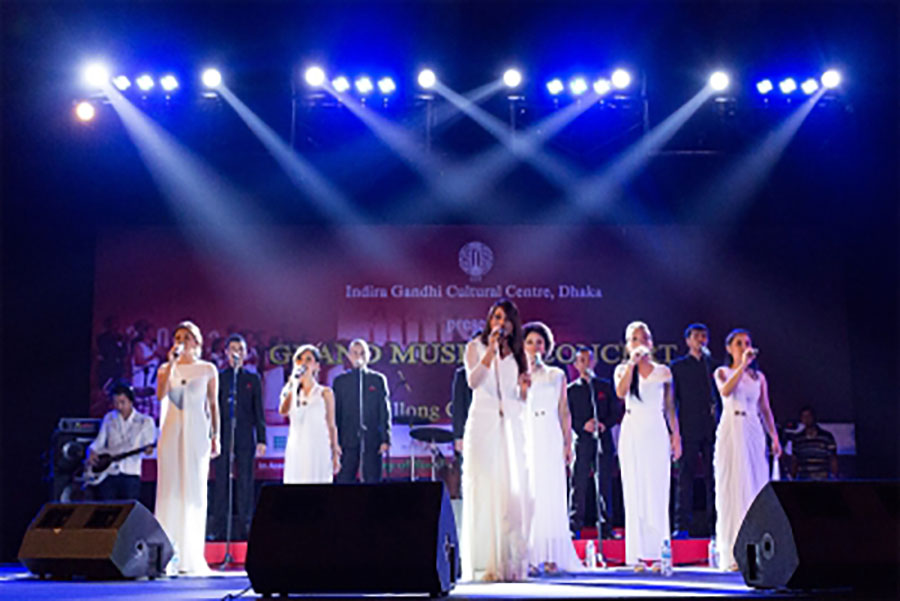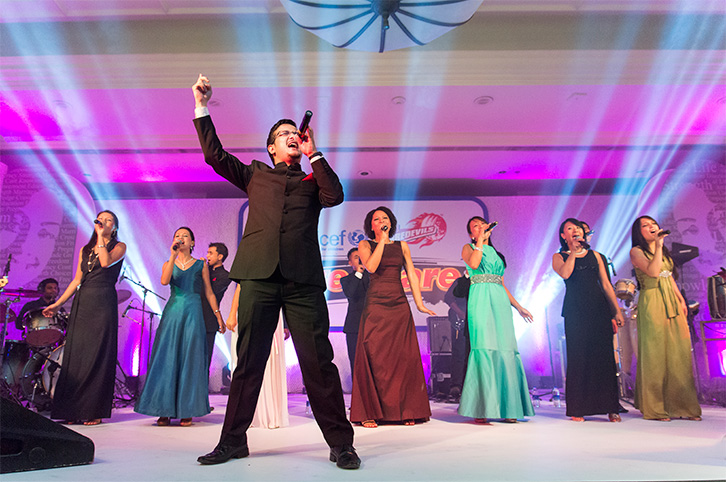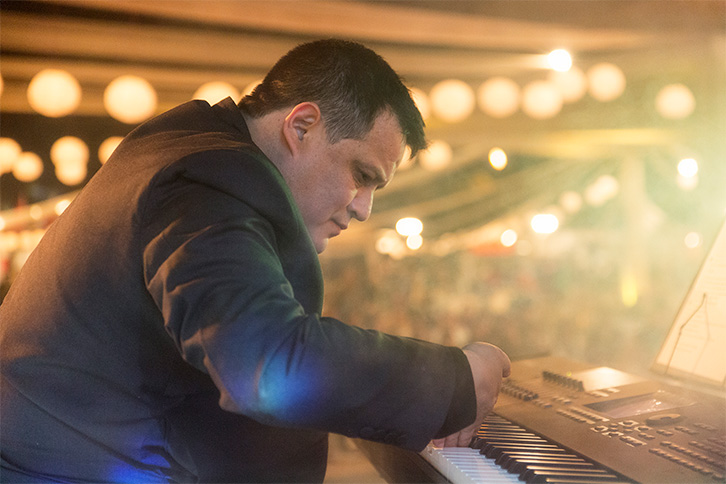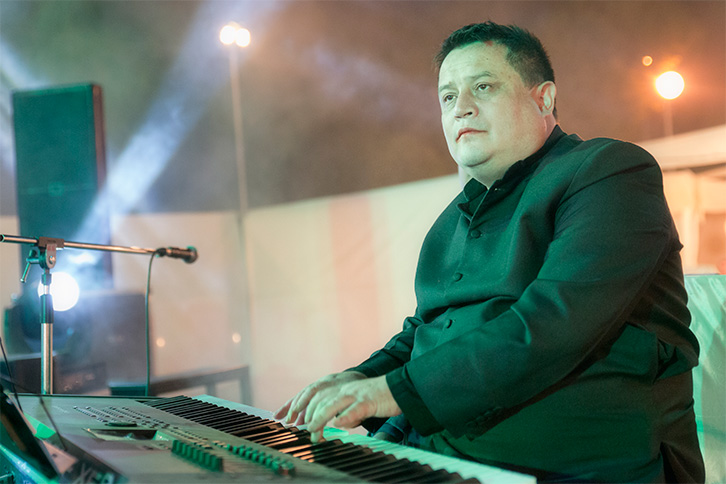
The Shillong Chamber Choir, which initially had mainly a local following, captivated the nation when they won the reality TV show India’s Got Talent 2010. That catapulted them to instant fame and popularity. Since then, they have mesmerized people across the world including Europe, the Far East and most recently, the US and Canada. Their ability to sing in various languages and genres have made them comfortable, flitting from collaborations with Bollywood superstar Amitabh Bachchan for Kaun Banega Crorepati, to singing German operatic music with the Vienna Chamber Orchestra; with belting out popular hits with Shankar Eshaan Loy and Usha Uthup to doing East/West fusion with Zakir Hussain.
Despite this “gradual slope of success” as Neil Nongkynrih the founder and director of the choir puts it, he and his team remain down to earth and ‘unaffected’. Integrity and warmth exudes Nongkynrih. In the early days in Shillong, his home, he was known as a child prodigy on the piano. He gave his first public recital at the age of six and amongst many people who remember that event in 1976 was the popular Assamese musician Bhupen Hazarika. Loy from Shankar Eshaan Loy also remembers him as the 12-year-old kid who dazzled his audience in New Delhi. Nongkynrih won his first national music competition at the age of 14. The rest, as they say, is history.
As he embarks on a new phase of his life, he talks to NE Travel and Life about the choir and the newly formed Shillong Chamber Productions (SCP).

What is the idea behind SCP?
SCP is just another small step to enhance what we are doing already. At present it will take care of the visual aspects of our music as well. We have just shot a music video with Rajesh Mapushukar and Maheep Dhillon as directors. Stanley D’Costa did the choreography. It was a beautiful experience (despite getting up at 3am on many occasions). There is still post production to be done but at this stage we are leaving it to the Mumbai crew. As we gain experience we will also venture into making films with emphasis on local flavours. What we lack in budget we hope to make up in content.
Shillong Chamber Choir (SCC) brought you fame, recognition and success. Did you ever imagine you would reach this far?
No. The reason being that the genre of music we started with was more exclusive. We did more classical in the beginning with a bit of Queen and Gershwin thrown in. I never saw myself doing Indian cinematic songs as it was not in me then. Now that I have discovered that we can have a different approach to a popular song and make it a ‘SCC sound’, then we are happy and it also gives the audience who know the songs to experience it in a different way. We often mix a popular Hindi song with an English one. This has opened up avenues we never imagined. It’s very important to be flexible in life.
How do you keep the Choir members grounded and disciplined?
When a person has spiritual nourishment for a long period, it sorts out a lot of unnecessary problems. We go through two types of shifts in our routine. When we are writing and composing it means staying up all night, recording and experimenting with different sounds. In the morning shift, we start with morning song and prayers and then we have meetings about various issues. The question is always how to better ourselves and our work. When a person has a habit of looking down the ladder, he/she becomes smug (no matter how little or great their achievements have been) but when he/she starts looking up the ladder and allows others who are much better than him/her to be a challenge, it creates a hunger to learn more. “Blessed are the poor in spirit for theirs is the Kingdom of heaven” is one of my favourite quotes.

How has being in the choir made a difference to the lives of the members?
Donna could not even make a cup of tea when she first came because she grew up in a boarding school. Now, she bakes cakes and is longing to do her own TV show with her vast experience of gourmet cooking. Ibarisha, who is our main soloist, was a timid 12-year-old girl when she first came. Within a month after joining her first gig was for President APJ Kalam at the Rashtrapati Bhawan and a special Christmas programme for NDTV. Three months later she sang in Switzerland in French, German and Italian apart from English. It was a solo recital. She also became an associate of the Trinity College of Music (London) at the age of 16. Sandon, who used to hide behind a pillar at the age of 17 when he was imitating Andrea Bocelli, now dances confidently in front of TV viewers!
What is the future of the choir?
I believe they are free to venture out and do whatever they wish. The production house will, of course, increase the possibilities to do other things. Riewbankit, one of my singers, is also a keen sound engineer. So, along with singing, that aspect of him is also evolving. Donna is a fantastic actress and so is Patricia. They might also act in some of the films we intend to do. In all of this they will also keep singing as long as it feels right.
Does Pauline, your sister, who taught you how to play and paint, continue as a mentor?
No! But she has turned pages in some of my concerts! Jokes aside, I think nowadays I don’t have one mentor. I feel I need to learn from as many as possible. It could be my tabla player, the bassist, the drummer or a choir member. I always listen to feedback from my fans and well-wishers and this way I keep in touch with other people’s richness. But to Pauline I think I’ll always be the three-and-a-half-year old little boy who sat in her lap and learnt ‘Fur Elise’ by Beethoven.
What do you remember about your childhood as a prodigy?
Personally, I don’t think of myself as a child prodigy. Obviously, I had a gift but I also had the opportunities that perhaps a poor boy with the same gifts would not have. There is a photo of me with uncombed hair at about four or so, sulking as I sat at the piano. So the story goes that I was woken up from my afternoon nap to play to my father’s friends (some of whom owned cinema halls) and obviously I had not had enough sleep and refused to play. Apparently, after much coaxing I whispered to someone that I wanted a hat passed around. They all laughed and took out their wallets. I guess I started to earn professionally from a very young age. The cinema hall owners were so pleased with my rendition of some of their favourite film music that for years, me and the lucky ones I invited, got free tickets to go to the movies. And mind you, they were dress circle tickets.


